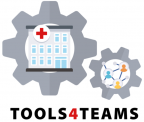Recruiting organisation: Eindhoven University of Technology, Eindhoven, The Netherlands.
Supervisor: Prof. Josette Gevers, Dr. Travis J. Wiltshire
Doctoral Candidate: Jingwen Yang
Secondments: Tilburg University, The Netherlands (3 months); REGIONH, Denmark (3 months)
Summary: The project aims to explore the effectiveness of team biofeedback (using wearables) in acute care context. Its objectives are to:
- Propose a theoretical framework regarding how team biofeedback can be designed in different formats to promote team effectiveness
- Make recommendations of effective biofeedback design for acute care teams by comparing various designs in empirical studies
Background
Prior work has shown that physiological signals can be indicative of certain team states or processes. Considering the high temporal resolution and low obtrusiveness of physiological measurement through wearables, its applications are expected to be especially suitable for supporting team effectiveness in high-stakes and critical team environments such as acute care and emergency response. A question that remains to be answered is how to effectively make use of physiological information to support team effectiveness. We will focus on an established technique—biofeedback—as a promising solution. Although biofeedback has commonly been used for improving health or performance at an individual level, structural exploration of its application in team contexts is required. Our work will contribute to both science and practice regarding how to design and implement biofeedback for acute care teams in an effective way.
Approach
The project aims to achieve its goals through:
- A systematic review of team biofeedback and the changes in team effectiveness brought by the technique.
- A empirical study exploring how acute care teams respond to simulated biofeedback physiologically, behaviorally, and perceptually.
- A lab study to compare different team biofeedback designs and decide on the optimal one
- A field study to validate findings in study 3 and establish effective biofeedback for acute care teams
Eindhoven University of Technology (TU/e)
The main workplace of the PhD student will be the Eindhoven University of Technology (TU/e). Eindhoven University of Technology offers academic education that is driven by fundamental and applied research. The research group is lead by Prof. Josette Gevers.
